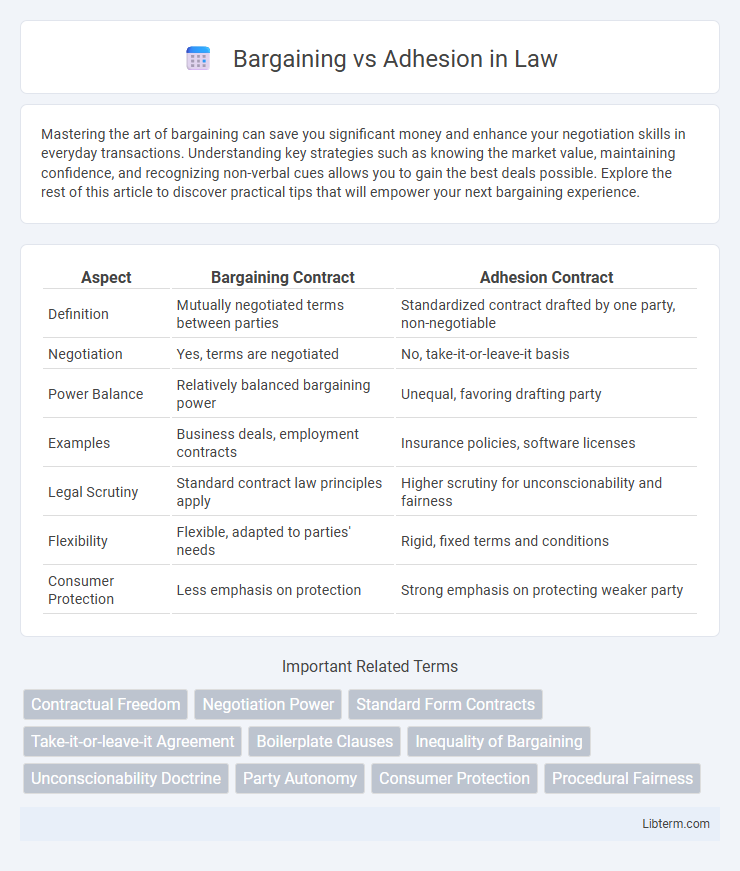Mastering the art of bargaining can save you significant money and enhance your negotiation skills in everyday transactions. Understanding key strategies such as knowing the market value, maintaining confidence, and recognizing non-verbal cues allows you to gain the best deals possible. Explore the rest of this article to discover practical tips that will empower your next bargaining experience.
Table of Comparison
| Aspect | Bargaining Contract | Adhesion Contract |
|---|---|---|
| Definition | Mutually negotiated terms between parties | Standardized contract drafted by one party, non-negotiable |
| Negotiation | Yes, terms are negotiated | No, take-it-or-leave-it basis |
| Power Balance | Relatively balanced bargaining power | Unequal, favoring drafting party |
| Examples | Business deals, employment contracts | Insurance policies, software licenses |
| Legal Scrutiny | Standard contract law principles apply | Higher scrutiny for unconscionability and fairness |
| Flexibility | Flexible, adapted to parties' needs | Rigid, fixed terms and conditions |
| Consumer Protection | Less emphasis on protection | Strong emphasis on protecting weaker party |
Introduction to Contractual Agreements
Contractual agreements involve two main types: bargaining contracts and adhesion contracts. Bargaining contracts result from negotiation between parties seeking mutually agreed terms, while adhesion contracts consist of standardized terms offered on a take-it-or-leave-it basis by one party. Understanding the distinction helps in evaluating consent, fairness, and enforceability in contract law.
Defining Bargaining Contracts
Bargaining contracts are agreements formed through mutual negotiation, where both parties actively participate in discussing terms and conditions to reach a consensus. These contracts emphasize equal bargaining power, allowing each party to propose, modify, and accept provisions before finalizing the agreement. Unlike adhesion contracts, bargaining contracts reflect a balanced exchange of promises and obligations tailored to the interests of all involved parties.
Understanding Adhesion Contracts
Adhesion contracts are standardized agreements drafted by one party with stronger bargaining power, offering the other party a "take it or leave it" choice without negotiation. These contracts are commonly found in consumer transactions, insurance policies, and service agreements, where the terms favor the drafting party and limit the weaker party's ability to modify provisions. Understanding adhesion contracts is crucial for recognizing potential unfair terms and assessing enforceability, especially when courts scrutinize unconscionability or lack of mutual assent.
Key Differences: Bargaining vs Adhesion
Bargaining contracts involve negotiation between parties with relatively equal power, allowing each side to propose and modify terms, while adhesion contracts are standardized agreements offered by one party with stronger bargaining power, leaving the other party little or no room for negotiation. Key differences include the level of mutual assent, the opportunity for modification, and the fairness of terms, as bargaining contracts emphasize mutual consent, whereas adhesion contracts often raise concerns about potential unfairness or unconscionability. The legal scrutiny applied to adhesion contracts is typically higher due to their take-it-or-leave-it nature, impacting enforceability in contract law.
Advantages of Bargaining Contracts
Bargaining contracts offer significant advantages by enabling parties to negotiate terms tailored to their specific needs, promoting fairness and mutual consent. This flexibility reduces the risk of disputes and enhances cooperation, as both sides actively participate in formulating the agreement. Customization in bargaining contracts often leads to better risk allocation and clearer obligations, improving overall contract efficiency.
Drawbacks of Adhesion Contracts
Adhesion contracts often lack negotiation flexibility, placing consumers at a significant disadvantage due to their standardized, take-it-or-leave-it nature. These agreements frequently contain unfair terms that favor the drafting party, limiting the consumer's ability to seek redress or modify conditions. Such contracts may also lead to disputes over ambiguities, as courts sometimes interpret unclear provisions against the party that drafted the agreement.
Legal Implications and Enforceability
Bargaining agreements involve negotiated terms between parties, offering flexibility but requiring mutual consent to ensure enforceability under contract law. Adhesion contracts, often standardized and presented on a take-it-or-leave-it basis, risk being unenforceable if courts determine they contain unconscionable terms or violate principles of fairness. Legal implications hinge on the presence of meaningful choice, with courts scrutinizing adhesion contracts more rigorously to protect parties from unfair impositions.
Consumer Protection in Adhesion Contracts
Adhesion contracts often pose significant risks to consumers due to their non-negotiable, "take-it-or-leave-it" nature, limiting consumer bargaining power and increasing vulnerability to unfair terms. Consumer protection laws aim to mitigate these risks by scrutinizing adhesion contracts for unconscionability, undue surprise, and one-sided clauses that disproportionately favor the supplier. Regulatory frameworks and judicial interventions enhance fairness by ensuring transparency and preventing the enforcement of oppressive terms in adhesion contracts.
Practical Examples in Various Industries
In retail, bargaining occurs at local markets where buyers negotiate prices directly with sellers, contrasting with adhesion contracts in e-commerce platforms where users must accept fixed terms without negotiation. The automotive industry highlights bargaining in dealership negotiations for vehicle pricing, whereas adhesion contracts manifest in leasing agreements with non-negotiable clauses. In the insurance sector, brokers facilitate bargaining on coverage options, while standard-form adhesion policies require customers to accept predefined contract terms.
Choosing the Right Contract Type
When selecting between bargaining and adhesion contracts, consider the level of negotiation flexibility and party autonomy involved. Bargaining contracts allow mutual negotiation, providing tailored terms suited to both parties' interests, while adhesion contracts are standardized, non-negotiable agreements favoring the drafting party. Understanding the transaction's complexity and power dynamics helps determine the appropriate contract type to ensure fairness and enforceability.
Bargaining Infographic

 libterm.com
libterm.com